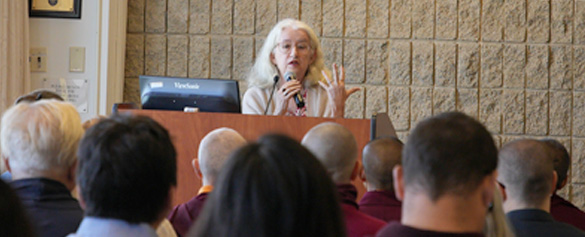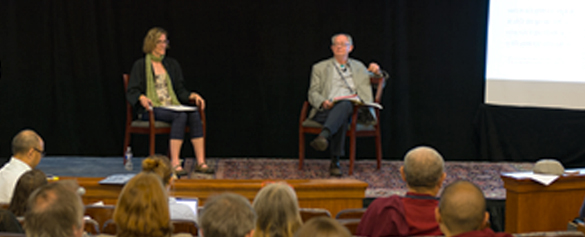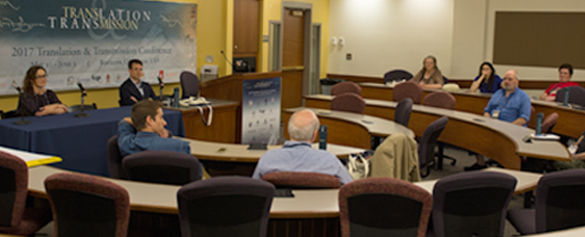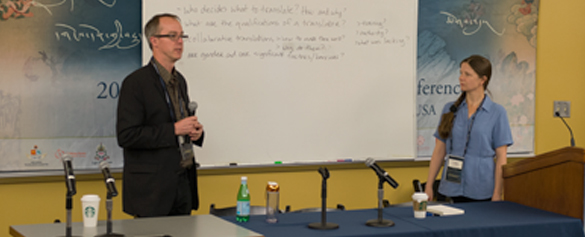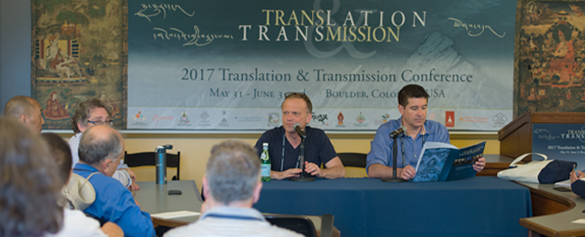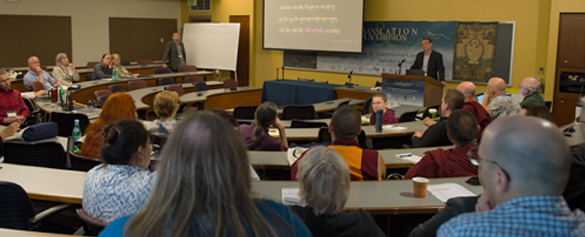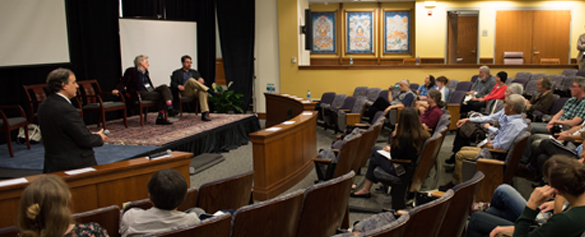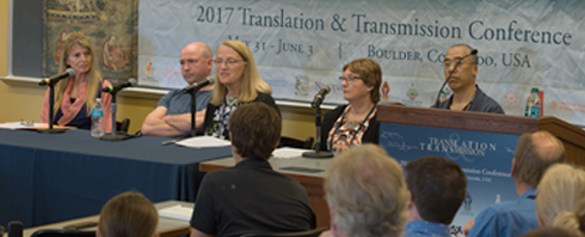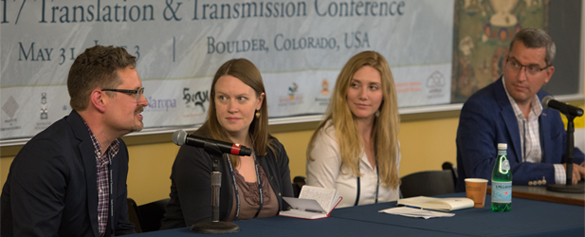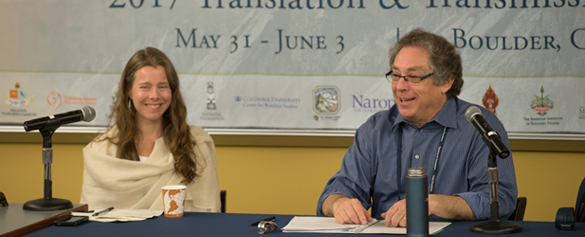Translation Theories Made Practical
Marcus Perman2022-11-16T23:34:10-07:00See the text discussed and presentation slides here.
Holly Gayley and Roger Jackson begin the discussion session with some provocations and a quote:
“Had translation depended for its survival on theory, it would have died out long before Cicero. Yet its practice has always assumed principle, the professional conscience of 2,000 years being summed up in Roman Jakobson’s ‘translator of what messages? betrayer of what values?’” – L.G. Kelly, The True Interpreter.
What makes for a good translation?
What are the translations you like to read and why?
What are the kinds of translations you like to create and why?
“Up to a point, each […]
Working Together: Approaches to Collaboration and Negotiation
Marcus Perman2022-11-16T23:34:10-07:00This discussion session was designed for maximum audience participation and covered topics provided by the audience, as well as touched on issues of collaboration with native speakers of either source or target language, competition between individuals and within groups, negotiation (with collaborators, but also with and between author and audience, translator and reader), and other questions of restriction, qualification, and inclusion. Some of the topics brought up by the audience included: differing intentions within groups, networking and connecting with a team, how to work together with one’s own guru, agreeing on hierarchies of correspondence, large-scale collaborations, and online forums.
Who Gets to Be a Translator? Qualifications and Questions of Authority
Marcus Perman2022-11-16T23:34:11-07:00An open discussion about qualifications and questions of authority related to translating and being a translator. Who decides what to translate? How and why? How do translator’s learn from each other? What qualities seem most important to cultivate as a translator? What are the qualifications of a translator? What trainings were the most important in your development as a translator? Or what was lacking? How does one measure the qualifications of a translator and how does one improve? How do you take ownership and responsibility for your work?
The Translator’s Intention: Motivation, Intended Impact, and Why They Matter
Marcus Perman2022-11-16T23:34:11-07:00This open discussion session focused on the themes of intention and motivation. Thomas Doctor and Eric Colombel facilitated the exploration of many topics the audience brought, including questions such as: What are the assumptions and expectations about reading audience? As a translator, do you feel the need to be clear and transparent about our background, perspectives, influences, and agenda? If so, how do you address that? What are we trying to reach in the readers? Cognitive understanding? Inspiration? Aesthetic enrichment? Somatic responses? Visionary opening? How do you assess the success of a translation?
Translation: Fidelity vs Innovation
Marcus Perman2022-11-16T23:34:11-07:00As translators we create new texts while striving to transmit the authenticity of the original. What constitutes an authentic translation? Throughout the history of Buddhism in Tibet and across Asia, adaptation, assimilation, and innovation have been essential to the persistence and continued relevance of texts and the contents they transmit. As translators, do we bear responsibility for fidelity to our texts? To our readers? To “the tradition”? To what degree may we innovate in the work that we do? In sum, what are the ethics of representation in our translation work, and how do we balance our fidelity to the […]
Large Scale Projects: Multi-Volume, Multi-Source Language, Collaborative Projects
Marcus Perman2022-10-30T22:00:13-06:00Large scale projects come with their own special challenges and this session with Robert Thurman, Editor-in-Chief of several major translation projects, including the Treasury of the Buddhist Sciences series, and James Gentry (filling in for John Canti of the Padmakara Translation Group) of 84000: Translating the Words of the Buddha project, addresses issues that arise when working on multi-volume, multi-source language, and collaborative projects. Tom Yarnall, a key editor and lead collaborator on the Treasury of the Buddhist Sciences series, facilitates the discussion.
Translating and Teaching Buddhism in the Modern World
Marcus Perman2022-10-30T21:56:53-06:00This special session follows from ongoing discussions among teachers and translators of Tibetan Buddhism in the west who are concerned with issues of transmission, teaching, and translating. This session will be a chance to explore some of these important questions with people from various organizations from around the world that have thought deeply about transmission and translation: What are the issues in teaching Tibetan Buddhism in the modern world? How do we balance integrity of tradition with the modern context? How does the availability of translations inform the process of transmission? When is it appropriate to use modern or secularized […]
Publishing Translations: A Q&A Session with Two Buddhist Publishers
Marcus Perman2022-10-30T21:59:27-06:00This session was a special opportunity to speak with the publishers and editors at Shambhala and Wisdom Publications and not only learn a bit more about their processes, but also to have the chance to ask questions about publishing translations.
Editing for Practitioners: Presenting Liturgies, Commentaries, and Songs of Realization
Marcus Perman2022-10-30T22:01:02-06:00This open discussion session focuses on themes and issues related to editing translations of liturgies for use in practical environments and will be as interactive as possible. Some of the questions discussed included: how do we develop appropriately sensitive language meant for recitation, to invoke the power of Buddhist practice? What is different when editing texts for practitioners? How shall we handle multilingual editions? What kinds of supplementary materials are needed? What kinds of musical genres can be implemented in liturgies and rituals?

